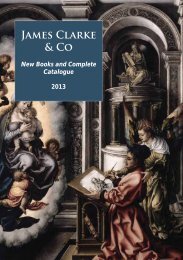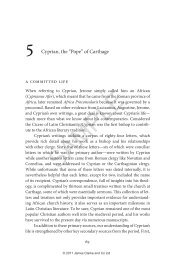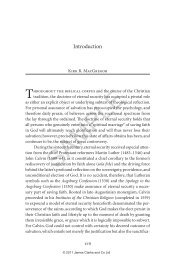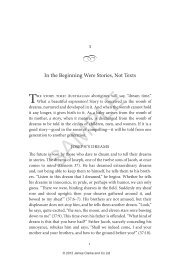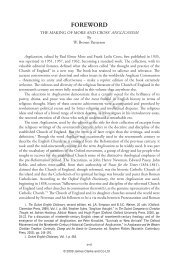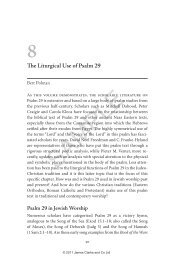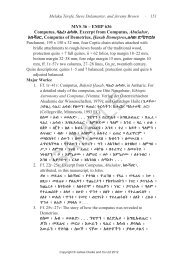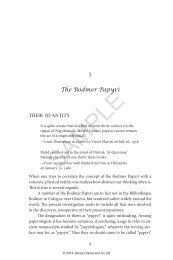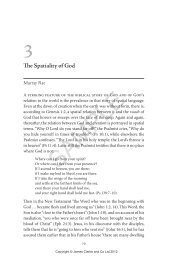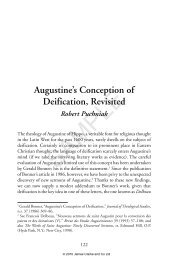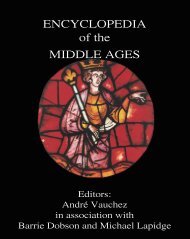Extract from Chapter 1 - James Clarke and Co Ltd
Extract from Chapter 1 - James Clarke and Co Ltd
Extract from Chapter 1 - James Clarke and Co Ltd
You also want an ePaper? Increase the reach of your titles
YUMPU automatically turns print PDFs into web optimized ePapers that Google loves.
56 MUSING WITH CONFUCIUS AND PAUL<br />
scriptive, the other descriptive, <strong>and</strong> one about event, the other substance.<br />
I am suggesting that for me as a modern Chinese, trained in the Western<br />
mode of discourse, the Analects may not be discounted simply because<br />
it does not proclaim truth in the same way Paul believes he is doing in<br />
Galatians. By bringing the Analects into an intertextual relationship with<br />
Galatians, I am not trying to resolve the issue of which is more authoritative.<br />
Intertextuality answers that question by acknowledging the mutually<br />
reinforcing authority of both texts. The Analects <strong>and</strong> Galatians are received<br />
texts that continue to speak to their respective global communities by<br />
virtue of their founding, canonical, <strong>and</strong> commentarial functions.<br />
Because the languages of the Analects <strong>and</strong> Galatians (classical<br />
Chinese <strong>and</strong> Koine Greek respectively) are alien to our modern Western<br />
experience, I have deemed it even more necessary for us to examine with<br />
care individual words, concepts, <strong>and</strong> phrases. This close interpretive process<br />
will prove helpful to us as we cross over <strong>from</strong> our cultures to that of<br />
antiquity. Furthermore, such a procedure will help us avoid letting our<br />
own cultural assumptions flatten out the otherness of the foreign culture.<br />
Most importantly, looking at the texts this way will help us personalize,<br />
perhaps even internalize, the wisdom of the classics, thus rejuvenating<br />
new life into the texts.<br />
I will summarize the basic rhetorical argument of the Analects <strong>and</strong><br />
Galatians below with the purpose of constructing the theological ethics<br />
of the two texts.<br />
SAMPLE<br />
THE ANALECTS: TEXT, LANGUAGE, AND CONTENT<br />
The Classic Text <strong>and</strong> Its <strong>Co</strong>mposition<br />
The Analects (Lunyu in Chinese), a term coined by a Scottish<br />
<strong>Co</strong>ngregationalist missionary to China called <strong>James</strong> Legge (1815–1897),<br />
means “categorized conversation” or “collection of sayings.” 5 The Analects is<br />
one of four <strong>Co</strong>nfucian classics, which, together with the Five Classics, were<br />
integrated into a <strong>Co</strong>nfucian canon in the Former Han era (201 BCE—25<br />
CE). The Four Books were the core texts of <strong>Co</strong>nfucianism—the Analects<br />
(Lunyu), Mencius (Mengzi), the Doctrine of the Mean (Zhongyong), <strong>and</strong><br />
5. See an excellent discussion on the Chinese title of the work <strong>and</strong> its textual history:<br />
Cheng, Lunyu Jishi; Yang, Lunyu Yizhu, 3–8; <strong>and</strong> Slingerl<strong>and</strong> trans., <strong>Co</strong>nfucius Analects,<br />
xiii–xxv.<br />
© 2008 <strong>James</strong> <strong>Clarke</strong> <strong>and</strong> <strong>Co</strong> <strong>Ltd</strong>



